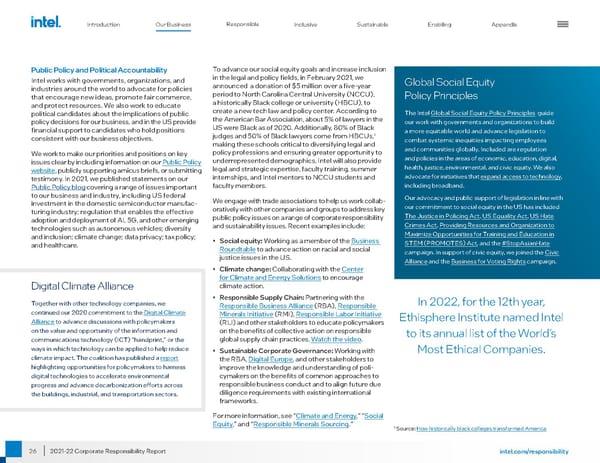26 intel.com/responsibility 2021-22 Corporate Responsibility Report Public Policy and Political Accountability Intel works with governments, organizations, and industries around the world to advocate for policies that encourage new ideas, promote fair commerce, and protect resources. We also work to educate political candidates about the implications of public policy decisions for our business, and in the US provide financial support to candidates who hold positions consistent with our business objectives. We work to make our priorities and positions on key issues clear by including information on our Public Policy website , publicly supporting amicus briefs, or submitting testimony. In 2021, we published statements on our Public Policy blog covering a range of issues important to our business and industry, including US federal investment in the domestic semiconductor manufac - turing industry; regulation that enables the effective adoption and deployment of AI, 5G, and other emerging technologies such as autonomous vehicles; diversity and inclusion; climate change; data privacy; tax policy; and healthcare. Global Social Equity Policy Principles The Intel Global Social Equity Policy Principles guide our work with governments and organizations to build a more equitable world and advance legislation to combat systemic inequities impacting employees and communities globally. Included are regulation and policies in the areas of economic, education, digital, health, justice, environmental, and civic equity. We also advocate for initiatives that expand access to technology , including broadband. Our advocacy and public support of legislation in line with our commitment to social equity in the US has included The Justice in Policing Act , US Equality Act , US Hate Crimes Act , Providing Resources and Organization to Maximize Opportunities for Training and Education in STEM (PROMOTES) Act , and the #StopAsianHate campaign. In support of civic equity, we joined the Civic Alliance and the Business for Voting Rights campaign. To advance our social equity goals and increase inclusion in the legal and policy fields, in February 2021, we announced a donation of $5 million over a five-year period to North Carolina Central University (NCCU), a historically Black college or university (HBCU), to create a new tech law and policy center. According to the American Bar Association, about 5% of lawyers in the US were Black as of 2020. Additionally, 80% of Black judges and 50% of Black lawyers come from HBCUs, 1 making these schools critical to diversifying legal and policy professions and ensuring greater opportunity to underrepresented demographics. Intel will also provide legal and strategic expertise, faculty training, summer internships, and Intel mentors to NCCU students and faculty members. We engage with trade associations to help us work collab - oratively with other companies and groups to address key public policy issues on a range of corporate responsibility and sustainability issues. Recent examples include: • Social equity: Working as a member of the Business Roundtable to advance action on racial and social justice issues in the US. • Climate change: Collaborating with the Center for Climate and Energy Solutions to encourage climate action. • Responsible Supply Chain: Partnering with the Responsible Business Alliance (RBA), Responsible Minerals Initiative (RMI), Responsible Labor Initiative (RLI) and other stakeholders to educate policymakers on the benefits of collective action on responsible global supply chain practices. Watch the video . • Sustainable Corporate Governance: Working with the RBA, Digital Europe , and other stakeholders to improve the knowledge and understanding of poli - cymakers on the benefits of common approaches to responsible business conduct and to align future due diligence requirements with existing international frameworks. For more information, see “ Climate and Energy ,” “ Social Equity ,” and “ Responsible Minerals Sourcing .” In 2022, for the 12th year, Ethisphere Institute named Intel to its annual list of the World’s Most Ethical Companies. Digital Climate Alliance Together with other technology companies, we continued our 2020 commitment to the Digital Climate Alliance to advance discussions with policymakers on the value and opportunity of the information and communications technology (ICT) “handprint,” or the ways in which technology can be applied to help reduce climate impact. The coalition has published a report highlighting opportunities for policymakers to harness digital technologies to accelerate environmental progress and advance decarbonization efforts across the buildings, industrial, and transportation sectors. 1 Source: How historically black colleges transformed America . Introduction Responsible Inclusive Sustainable Enabling Appendix Our Business
 Intel Corporate Responsibility Report Page 25 Page 27
Intel Corporate Responsibility Report Page 25 Page 27